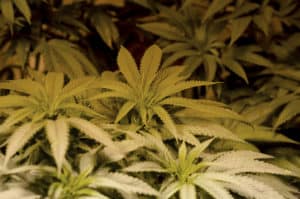Marijuana may be a powerful antidote for alcoholics and those dealing with opioid addiction to come clean, says a new study in Clinical Psychology Review.
A research team from the University of British Columbia conducted a comprehensive review of available medical literature on the medical use of cannabis and discovered an overall trend of mainly positive outcomes when it comes to patients staring down drug addiction.

“Research suggests that people may be using cannabis as an exit drug to reduce the use of substances that are potentially more harmful, such as opioid pain medication,” said Zach Walsh, the study’s lead author and associate professor of psychology at the University of British Columbia.
Walsh and his team analyzed more than 30 previous studies on the topic to gauge the patterns and effects of what they call “cannabis for therapeutic purposes” among individuals.
In addition to evidence showing that cannabis can help alcoholics and drug users kick the habit, the researchers found a positive effect of therapeutic cannabis on post-traumatic stress disorder (PTSD), a condition that affects about eight out of 100 people at least once in their lives – and sees much higher rates among veterans.
They also found evidence that marijuana use can ease depression and lower stress. Importantly, they noted that “cannabis use does not appear to increase risk of harm to self or others,” but they called for more research to further solidify their findings.
New Evidence as America Goes Green
The new research comes on the heels of a historic week for the marijuana industry, which saw voters in seven states in the U.S. elect to legalize the drug in some form. Four states voted to allow for recreational use, and three others decided to legalize marijuana for medicinal purposes. All told, more than half the country, or 27 states, now accepts the use of marijuana legally.
While highlighting the positive benefits, the researchers also warn that indulging in marijuana is not the best choice for all individuals, according to their review of the medical literature. They found that the use of cannabis for therapeutic purposes “may be problematic among individuals with psychotic disorders.”
They add further that the “clinical implications of [cannabis] use among individuals with mood disorders are unclear.”
Despite the warnings, it appears that current medical literature shows high promise for a drug that’s long been vilified. “In reviewing the limited evidence on medical cannabis, it appears that patients and others who have advocated for cannabis as a tool for harm reduction and mental health have some valid points,” noted Walsh.
The new study underscores the importance for the medical field of keeping up with a much higher level of acceptance than there has ever been in the past. Specifically, the researchers point to a general lack of understanding – and rigorous testing – of marijuana use among professionals.
“There is not currently a lot of clear guidance on how mental health professionals can best work with people who are using cannabis for medical purposes,” said Walsh. “With the end of prohibition, telling people to simply stop using may no longer be as feasible an option. Knowing how to consider cannabis in the treatment equation will become a necessity.”
Richard Scott is a health care reporter focusing on health policy and public health. Richard keeps tabs on national health trends from his Philadelphia location and is an active member of the Association of Health Care Journalists.


![How To: ‘Fix’ Crepey Skin [Watch]](https://cdn.vitalupdates.com/wp-content/uploads/2017/05/bhmdad.png)












